Last Updated on December 9, 2021 by Chris and Lindsay
So you’ve made the first steps to starting a blog and now you’re asking the question how do I monetize my blog?
Monetizing your blog is a great way to make money while you travel. It’s also a fantastic way to earn revenue while you sleep or do other things you want or have to do.
There are certainly different ways to monetize a website. And the most lucrative websites will combine a variety of monetization strategies.
In this post, we’ll answer the question of how to monetize a blog by sharing our personal experience, strategies and results.
Affiliate Disclaimer: This post includes affiliate links (as a way we are monetizing our website!). This means we will receive a small commission if you choose to purchase the products and services that we recommend.
NOTE: We will let you know each affiliate link in this post so you can see our monetization strategy in action!
7 Ways How To Monetize A Blog
While there are hundreds of variations of the following monetization strategies, there are really only 7 ways to monetize your blog. And the old proverb about “jack of all trades, master of none” applies to blog monetization the same as it does to any other skillset in life.
If you attempt to use all 7 blog monetization strategies in your website you will experience various degrees of success. It may be better to focus on one or two at a time until you master these strategies and can implement others.
However, another proverb about putting all of your eggs in one basket also applies. If you can incorporate the following 7 strategies for making money blogging into your website then you can count on building a relatively stable foundation of revenue.
As we have focused on growing revenue from our website we have found that we are definitely subject to the ebb and flow of seasonality and external events impacting our financial success.
The more you can incorporate these 7 blog monetization strategies the more consistent your revenue and, more importantly, growth and success of your blog will be.
Without further delay, let’s get into each of the 7 ways how to monetize a blog.
| 7 Ways to Monetize Your Blog |
|---|
| Affiliate Marketing Products and Services Advertisements Sell your own products/services Sponsored Content Offer Courses Donations YouTube (BONUS SECTION) |
1) Affiliate Marketing of Products and Services
Affiliate products and services are the quickest and easiest way to monetize a blog. What is affiliate marketing?
Essentially you are an affiliate (salesperson) for a company when you promote its products/services to your audience in exchange for a small commission. Instead of spending money trying to market to your audience, the company relies on your influence to sell their products.
In exchange, they offer a small portion of the sale in a win-win-win situation (customer is happy, the company makes a sale and you get paid too!).
This is the most common form of making money from a website and has some great benefits:
- Benefits your readers based on your personal experience and recommendations
- Can begin monetizing immediately
- A broad range of products and services
- Numerous affiliate marketing networks to join for wider access to affiliate products and services
Before we had any substantial amount of traffic to our website we signed up to be affiliates for some of our favorite companies. We knew that our influence would grow and we would connect with readers who really wanted to know what we thought about and recommended to answer whatever questions brought them to our website in the first place.
Authenticity and transparency is important for us when it comes to our readers. So the first companies we became affiliates for were those we genuinely loved and used on a regular basis:
- Harvest Hosts (Free RV camping)
- Renogy (RV solar power)
- Amazon (variety of products)
- iROCKER SUP (standup paddleboards)
Sometimes affiliate companies will offer discounts that you can extend to your audience. Other times your readers just have to trust you and follow your recommendations.
If you are honest and genuine with your readers and have real solutions to the questions that bring them to your website then you are certain to have success as an affiliate.
TIP: If you are new to affiliate marketing and want to get a HUGE head start on learning about affiliate marketing and how to monetize your website we recommend this course from Michelle at Making Sense of Cents. Michelle is one of the leading affiliate marketing experts who has come from the same humble background as most of us learning how to monetize a blog.
(This is an affiliate link. We took her course and found that the content in it would perfectly suit anyone looking to monetize a website through affiliate sales.)
See how that works? If you trust us (and we hope you do!) and you genuinely want the best source for learning the ins and outs of affiliate marketing then we’ve just created the perfect win-win-win scenario and put affiliate marketing to work!
But do know that there are some disadvantages to affiliate marketing. They are small and certainly have not discouraged us in any way from pursuing affiliate marketing as a way to make money blogging.
| Advantages | Disadvantages |
|---|---|
| * Based on your personal experience and recommendations * Can begin monetizing immediately * A broad range of products and services * Numerous affiliate marketing networks to join | * Often small commissions * Links and affiliate programs often change * Affiliate sales often seasonal |
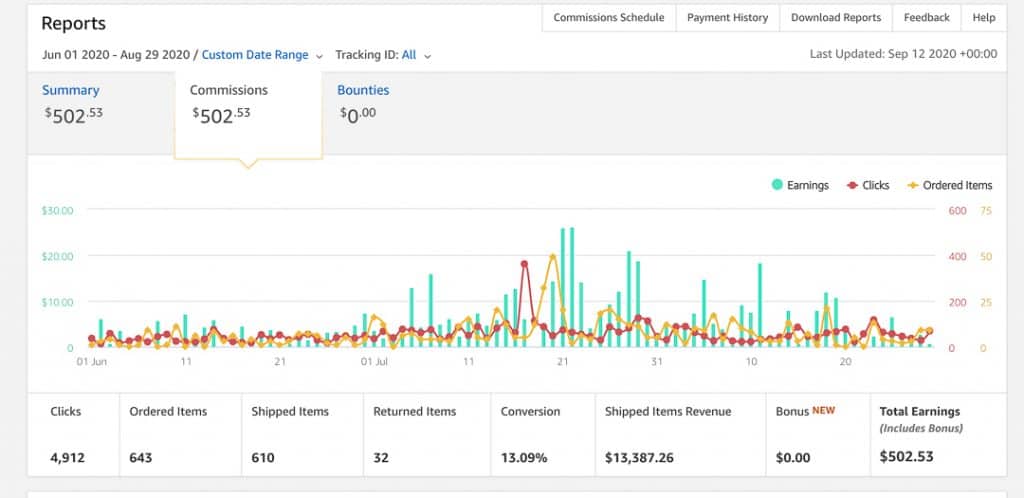
2) Advertisements
Advertisements are the age-old way for any form of media to make money. Whether reading your favorite newspaper or magazine, binging your favorite television show or cruising around the internet searching for ways to monetize your blog you know that you are being bombarded by advertisements.
Because they have become a way of life, it is not uncommon to find advertisements in various forms on websites as they are a great way to monetize a blog.
Benefits of Advertisements
- Provides value to your readers
- Generates revenue 24 hours a day, 365 days a year
- Can pay substantial amounts of revenue
At first, we were very reluctant to run advertisements on our website. Personally we did not like to visit websites with popups and ads crammed in every space. It made reading the articles we wanted to read difficult and discouraged us from staying on that site.
But then we learned that not only are advertisements overwhelmingly common practice among websites but also with the right advertisement agency we could limit the kind and amount of advertisements that display so that we can remain focused on our readers’ experience.
When you begin looking into running advertisements as a way to monetize your website you’re going to come across these main ad management companies:
- Google AdSense
- Monumetric
- Ezoic
- Mediavine
- AdThrive
Without getting too far down the rabbit hole of ad management companies, each one offers its own benefits and disadvantages. If you’re just getting started with your website here’s what we’d recommend.
- Decide if/when you want to run advertisements. We didn’t want to run ads until we had at least 20-25K monthly sessions. But maybe you want to start sooner.
- Start with Google AdSense if monetizing your website is important right away. You can run AdSense ads whether you have 1 or 1 million monthly sessions. AdSense pays the least of all ad management companies. But at least it is revenue.
- At 10K monthly sessions apply to Ezoic. We ended up partnering with Ezoic when we reached 20K monthly sessions and we are THRILLED that we did. We decided to go with Ezoic instead of Monumetric at this level for a variety of reasons we outline in our Ezoic review here.
- Stick with Ezoic until you get to at least 50K monthly sessions and then consider whether you want to switch to Mediavine. (Note: AdThrive is quite exclusive and is not accessible until at least 100K sessions).
Ads are a lucrative way to monetize a blog. In fact, in our first month with Ezoic and 20K monthly sessions, we earned $450! This was more than our previous monetization strategies combined for the previous 6 months!
The second month we made around the same, even when our traffic trailed off seasonally. We then started to see a month-over-month increase and hope to soon be able to support our entire full-time travel budget from advertisement revenue alone.
TIP: If you are at or near 10K monthly sessions and want to begin monetizing your blog through advertisements either click this link to get started right now or read our Ezoic review to learn more about why we are glad we began advertising through Ezoic when we did.
(This is an affiliate link as well. Ezoic will pay us a small commission for referring you to them. But remember from our notes about affiliate marketing, we only recommend the products and services we 100% stand behind and Ezoic continues to perform for us!)
But do be aware that there are also disadvantages of running advertisements as a way to monetize a blog:
| Advantages | Disadvantages |
|---|---|
| * Provides value to your readers * Generates revenue 24 hours a day, 365 days a year * Can pay substantial amounts of revenue | * Require relatively large amounts of traffic * Can discourage your audience if they are too numerous or intrusive * Will slow down your website to some degree |
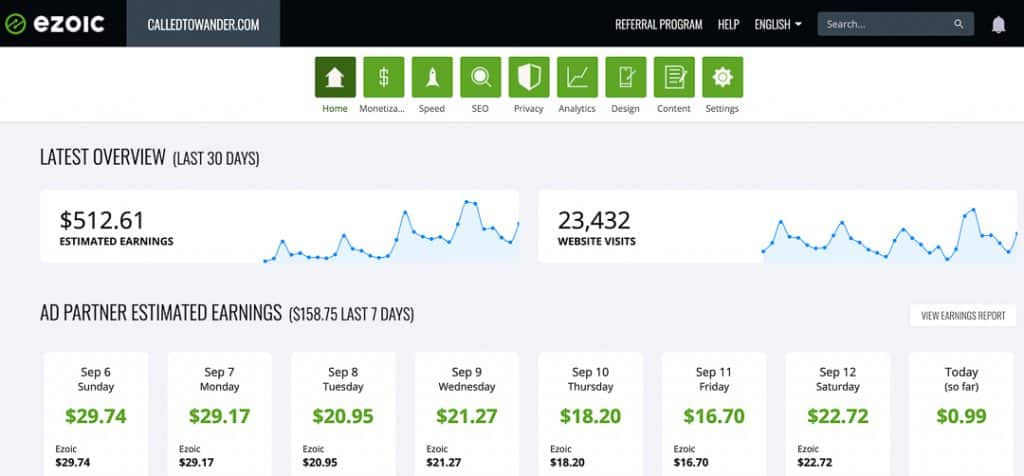
3) Sell your own products/services
Selling your own products and services is probably the most profitable way to monetize a blog. Unlike affiliate marketing, where you leverage your audience in exchange for a portion of a sale of someone else’s product, you receive the full sales revenue from the products and services.
Benefits of selling your own products/services:
- They belong to you
- Use your expertise/passion to create something you love
- Higher commission/revenue opportunities
- Control your own marketing and distribution
However, this will look as different and be as unique as you and your website are.
If you have a blog you are not necessarily marketing products and services the way a professional company might. Having a recipe or travel blog, for instance, is different from running a bakery or a tour company.
So while you may not be selling cakes or epic adventures on your website (though you certainly can!) you might sell the experience you have with those things in a variety of different ways.
A common product among bloggers is an ebook about whatever or wherever they are experts. Food bloggers often offer electronic or hard copy recipe books.
Influencers may also offer swag in the form of hats, shirts, buttons, stickers and so forth.
Really you can sell whatever you want – especially since it is your own product and services.
We don’t currently offer any products or services through our website. But we do have several ideas we plan to develop once we have a little more revenue coming in so we can take the time to develop the products.
Connect with us on Facebook, Instagram and YouTube to learn more about those products when we finally get them done!
Like all other forms of monetizing a blog, there are disadvantages of selling your own products and services on your blog:
| Advantages | Disadvantages |
|---|---|
| * They belong to you * Use your expertise/passion to create something you love * Higher commission/revenue opportunities * Control your own marketing and distribution | * Time, energy, effort and expense to develop the products/services * Learning/paying how to distribute products/services * Handling customer service/support for your products/services |
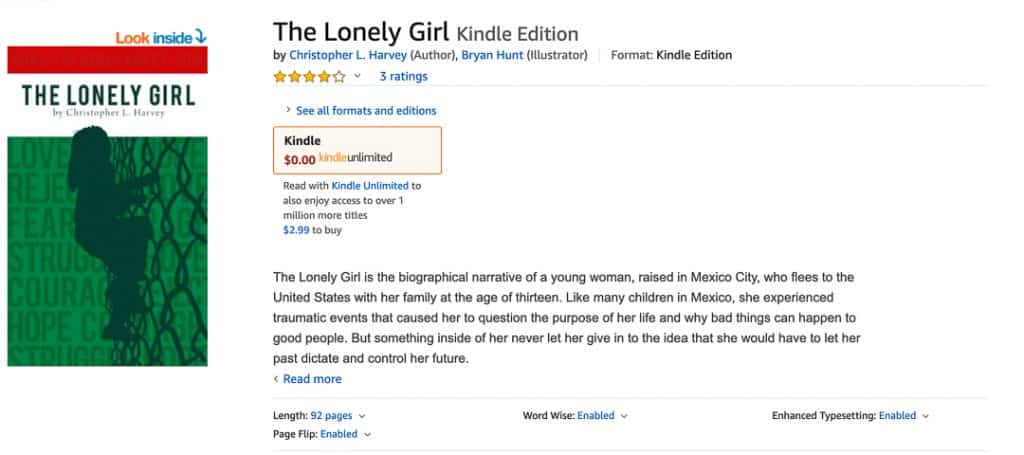
4) Sponsored Content
Another great way to monetize a blog is to publish sponsored content on your website. This usually only happens once your website has grown both in traffic and authority on a subject.
But it is exciting to open an email where someone wants to pay you to write and/or publish an article on your website.
There are some pretty straightforward benefits to posting sponsored content:
- Receive a check right away
- Built rapport and authority with larger brands and companies
- Offer unique insight to help your readers solve a particular problem
- Meet and/or expand your brand with new content
Sponsored content can take many shapes and forms and may extend beyond your website. In the social media world, people who monetize from sponsored content are considered “influencers.”
This isn’t because they set any moral standard for society to follow (though they may!). Rather, companies pay them to influence the spending habits of their followers/subscribers.
In terms of monetizing a website with sponsored content you may be approached by a company that has taken notice of your traffic and/or ranking for a particular keyword or topic.
They may offer you a flat amount, or perhaps an affiliate marketing arrangement with more favorable terms, in exchange for you writing a post about their product/service.
Sometimes companies will provide samples of their products/services so that you can write a fair assessment of them. This is where travel bloggers in particular get excited about the idea of monetizing a website through sponsored content.
Imagine getting paid to fly to some beautiful part of the world to go on some epic adventure in exchange for writing a post (or posts) and making a few plugs on social media.
Sounds ideal, right?
It doesn’t always work that way. But sometimes it does and we know plenty of travel bloggers who make a small fortune (and have in life experiences!) going on these kinds of sponsored content trips.
We haven’t done any of these. But we do get approached regularly by companies that want us to write about their products or services.
However, we have a VERY STRICT policy of not promoting any products or services that we do not own or use ourselves. So if a company is not willing to provide us with a sample or what they want us to post on our website then we will refuse to work with the company.
Sadly we have turned down far more of these opportunities than we have been able to negotiate. But we want to make sure that our readers trust us and we will not compromise this integrity for a few bucks in the short term.
Of course, there are a handful of disadvantages to publishing sponsored content:
| Advantages | Disadvantages |
|---|---|
| * Receive a check right away * Built rapport and authority with larger brands and companies * Offer unique insight to help your readers solve a particular problem * Meet and/or expand your brand with new content | * May not fully believe in the sponsored product/service * Limited revenue as you get paid once * May seem inauthentic to your audience * Could take away from your own products/services, affiliate marketing opportunities |
5) Offer Courses
A very common product that is becoming more and more popular as a way to monetize a blog is creating, marketing and selling courses. Companies like Teachable and Udemy have made it pretty simple to create courses about pretty much any and every topic for which you may find yourself an expert.
If you are an expert (and we’d advise that you truly have some notable level of expertise) and you are passionate about sharing what you know with an audience you think would pay to learn what you know, then offering a course is a great way to monetize your website.
Some of the reasons you’d want to consider monetizing your blog by offering courses include:
- More individualized and detailed information for your customers to help them solve a specific issue(s)
- Generating sales revenue 24/7
- Create it once and sell it forever
- Express your creativity and drive to help people in a format more consistent with traditional instruction
We are teachers at heart. We love the idea of helping people navigate through the situations we have come without having to go through the negative experiences we have had.
But to date, we have not felt as though we had any credible expertise that has merited the time and effort to create a course. However, just as we have great ideas for resources that would fill ebooks and bookshelves, we do think we will offer several courses down the road.
That said, there are definitely some disadvantages to offering courses:
| Advantages | Disadvantages |
|---|---|
| * More individualized and detailed information for your customers to help them solve a specific issue(s) * Generating sales revenue 24/7 * Create it once and sell it forever * Express your creativity and drive to help people in a format more consistent with traditional instruction | * Time, energy and money to plan and create courses * Lots of competition in many niches * Pay fees/commission to companies you would not pay for selling your own products/services |
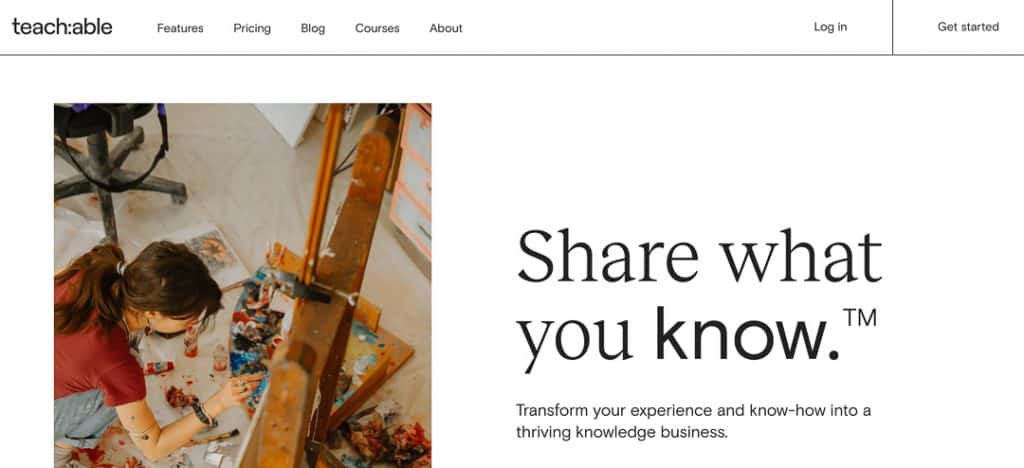
6) Donations
OK, so donations seem to be an obvious way to monetize a website. But it is an often-overlooked strategy as well.
While we come from the mindset of working hard to monetize our website and generate revenue on our own, we also know that if you do not make it possible for people to donate to you then you are saying “no” to a source of revenue that may be in line with your particular blog.
As much of what we do when we travel is designed to physically help people, we have always been open to accepting donations. But it was not until we were halfway through our first year on the road that we finally put a “donate” button on our website.
Benefits of accepting donations:
- You never know who will choose to support you
- It invites others into your story on a more intimate level
- Minimal costs (usually paid by donor) and no physical product or effort to create products/service
You do not have to be a nonprofit in order to accept donations. And companies like PayPal and Venmo make it easy to encourage readers to donate to your website. You can also run a GoFundMe campaign if the events in your life and the topic of your website merited it.
We offer our readers the option to support us through one-time or recurring monthly donations via PayPal. And we also encourage our readers (and YouTube subscribers) to consider supporting us through Patreon.
Patreon is a way that we, as content creators, can ask for financial support in exchange for various tiers of “thank you” to our Patrons.
For example, for a $2 monthly patronage, we offer exclusive Patron updates and invitation to our private Facebook group. For $25 per month, our Patrons get those benefits plus we’ll send a monthly postcard from the road and provide public thank you’s on our website and social media.
The “thank you” is a huge part of monetizing a blog through donations. So if you choose to go this route we would encourage you to be gracious with your donors and involve some level of transparency, if you can, for how the donations will be used.
Of course, accepting donations also has some disadvantages:
| Advantages | Disadvantages |
|---|---|
| * You never know who will choose to support you * It invites others into your story on a more intimate level * Minimal costs (usually paid by donor) and no physical product or effort to create products/service | * Requires trust between you and your readers that may not always be a focus of a website * Has tax implications that are not easy to understand * Difficult to generate with all of the other reasons people have to donate money to all sorts of other individuals and organizations |
NOTE: We do not encourage you to solicit donations unless you genuinely represent your brand to your audience. Donations should be considered sacred because donors trust who you represent yourself to be on your website, social media, etc.
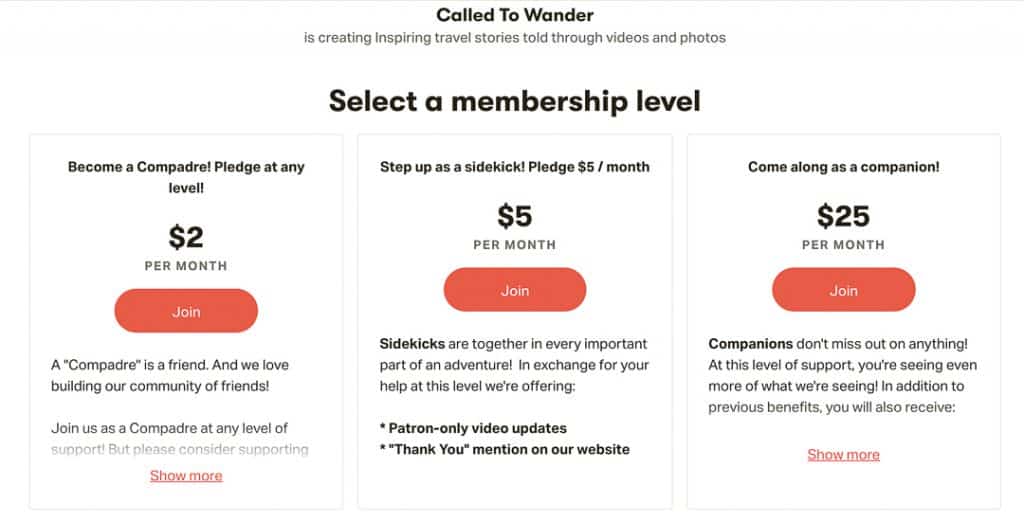
7) YouTube (BONUS SECTION)
A final way that you can monetize a blog is by harnessing the power of YouTube. We’ve included this as a “bonus section” because not only does the monetization of YouTube take place on your YouTube channel and not directly on your website, but also because monetizing on YouTube involves several different strategies.
Of course, if you are considering monetizing your blog using YouTube it also requires that you have a particular skill set that involves both filming and editing videos.
We had a background working in the documentary film industry. But we were producers and directors and always hired our camera crew and editing team.
As a result, we had a steep learning curve when it came to creating content for YouTube. In fact, we were so discouraged that the hundreds of hours we put into editing videos resulted in such a small viewership in our first year and a half of running our YouTube channel that we nearly gave up.
However, as our travel story was dynamic – in attempting to drive from Florida to Alaska and then on to Argentina – we wanted to share it visually as well as through our website and social media.
So we stuck it out and gradually our YouTube audience grew. We had a handful of semi-viral videos (in the tens of thousands of views, not millions!) that boosted both our analytics and our spirits and today the small amount of revenue we generate from our YouTube channel doesn’t pay us dollar-for-dollar for what we put into each video.
But we see that our audience (and revenue) is growing and, more importantly, we have a small but dedicated audience that engages with us through each video and we know we are making a real difference in the lives of other people, which is our primary goal for life.
There are several ways that you can monetize YouTube. You’ll probably recognize a few of these:
- Ads (through AdSense)
- Sponsored content
- Selling your products and services
- Patreon (donations)
- Affiliate sales
There are plenty of people who make substantial revenue from YouTube. And there are plenty of people who make substantial revenue from monetizing their blog.
But there are very few people who are successful in doing both.
In fact, we go back and forth almost every day about whether we should cut ties with one or the other. But we enjoy building our website AND creating videos. And right now we don’t need to become famous (or rich) from either – let alone both.
But if you think you will include YouTube in your plans to monetize your blog then you can also incorporate it on your website as a way to integrate them together. Encourage visitors to your website to see your YouTube channel and videos.
Embed your videos into as many posts on your website as possible. And likewise, reference relevant website posts in your videos and video descriptions.
YouTube is an extension of Google and all online marketing experts see YouTube continuing to have more and more relevance and influence in the future. Maybe you have noticed that videos now take up the first space above the fold when you search for many topics?
If you can incorporate YouTube into your website monetization strategy then you open up new floodgates of revenue opportunity.
Of course, some disadvantages of incorporating YouTube into your blog include:
- Time to learn how to film and edit (if necessary)
- Requires more expensive equipment and software
- Takes time to create and edit content
- Requires time to slowly build an audience
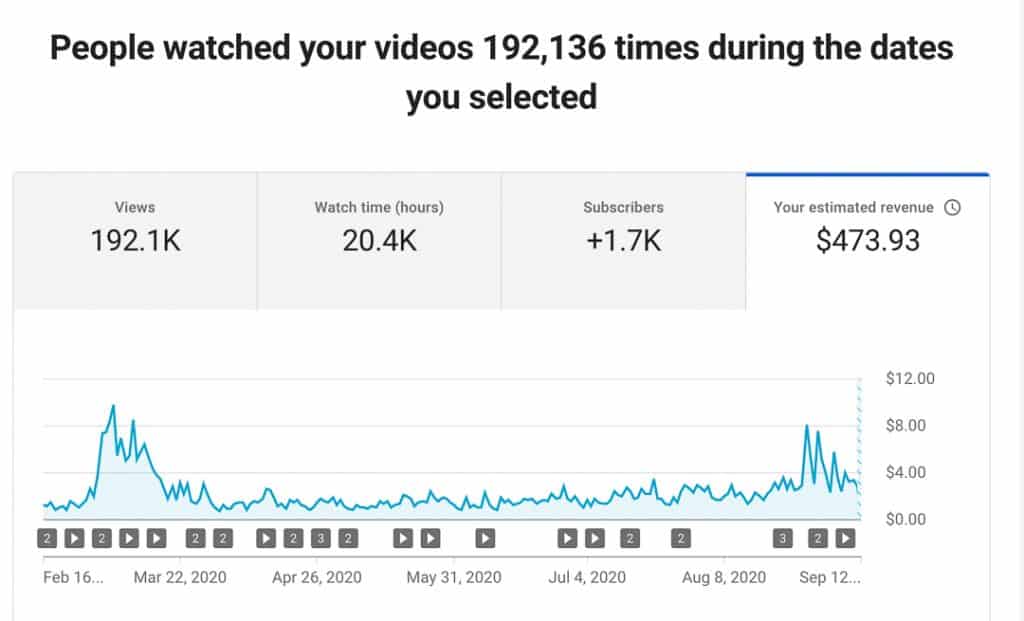
Wrapping Up: How To Monetize a Blog
Learning how to monetize a blog is exciting. When you realize that all of your time and effort to share content with the world can actually result in revenue it can become like a game of sorts.
As you look at the 7 different ways to monetize a website you have to choose how to allocate your time and resources toward those strategies that will result in the greatest gain.
But when you start to see money deposited into your bank account, or when you check affiliate dashboards or another analytics day-after-day and realize how much you made while you were sleeping, monetizing a blog takes on a different meaning.
It means freedom. It means hope that things will continue to get better. And most of all, it’s like getting a pat on the back for all of the time and effort you have put into sharing your expertise with the world.
Whether you’re looking for a little passive income or want to find financial freedom when you monetize a website, the sky is literally the limit as you become better and better at building revenue from your blog.
We hope this post has helped you learn how to monetize your blog. Please reach out if you have any questions or other ideas we can mention to help other readers!
